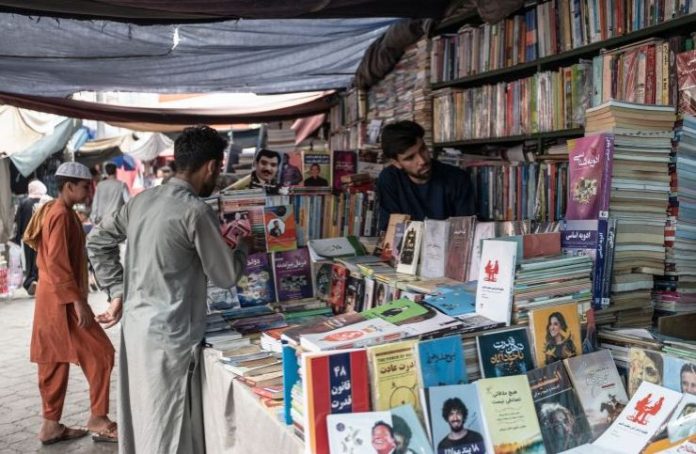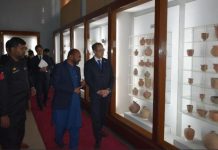It has been almost two years since the Taliban took over Kabul. I, like many Afghans who worked hard to attain a good education, am struggling. Knowledge seems to be losing its value and books are no longer considered a precious possession.
When Taliban fighters arrived in the Afghan capital in August 2021, many of my friends rushed to the airport to try to leave, seeing no prospect for themselves in their home country anymore. The brain drain was immense.
People with masters’ degrees, PhDs, with multiple published books, professors, educators, medical doctors, engineers, scientists, writers, poets, painters – many learned people fled. A colleague of mine – Alireza Ahmadi, who worked as a reporter – also joined the crowd at the airport.
Before he left, he wrote on his Facebook page that he had sold 60 of his books on a variety of subjects for 50 Afghanis (less than $1). He never made it out of the country; he was killed in the bombing of the airport by the Islamic State in Khorasan Province.
I, too, decided to give away all my books – all 300 hundred of them, covering topics like international law, human rights, women’s rights and the English language. I donated them to public libraries, thinking that in a country ruled by the Taliban, they would be of no value to me.
I started searching for ways to leave the country. Evacuation was not an option for me so I decided to go to Iran, hoping I could find safe haven there like millions of other Afghans. But like my fellow countrymen and women, I faced contempt and hostility there. I soon lost all hope that I would be able to make a living in Iran. But I did find something that kept me going – my old love for books.
One day, as I walked along Enqelab Square in Tehran, I could not hold back from entering its bookstores. I ended up spending most of the little money I had on books about human rights and women’s rights that I had never seen in Afghanistan. Armed with these volumes, I decided to go back home and try to get back into my old way of life – surrounded by books and engaged in intellectual pursuits.
Upon returning, I started working on a book about the political rights of women within the international legal system and within Islam, which I managed to complete in about a year. I sent my manuscript to different publishers, but was repeatedly turned down because they found the subject too sensitive and thought that getting permission to publish it would be impossible.
Finally, Ali Kohistani of Mother Press agreed to take the book. He prepared the needed documentation and submitted the manuscript to the Taliban Ministry of Information and Culture to request formal permission to publish. Soon after, the committee tasked with book review sent me a long list of questions and critiques that I had to address.
I revised the book along the feedback they sent, but that was not enough to get permission. It has been five months now that we have waited for a final response and my despair is growing by the day.
Kohistani has gone to the ministry many times to inquire about the manuscript, with no results. He has told me that he has five other books he wants to publish this year but none of them have been cleared by the ministry.
Other publishers are also suffering from the arbitrariness of the commission’s decisions and long delays. They say books that the Taliban want to publish and that fall within their ideology do not face the same challenges. They see in this fraught process an attempt to suppress any thought that disagrees with the Taliban’s thinking.
Publishing permission delays and censorship are by far not the only problems Afghanistan’s book industry is suffering from.
Scores of bookstores and publishing houses have shut down in the past two years. In the book compound in the Pul-e-Surkh area of Kabul, which I use to frequent before the Taliban takeover, the majority of bookstores have now shut down.
The Taliban’s decision to ban girls and women from attending high school and university means they are no longer buying books as much. Boys and young men have also dropped out of school and universities, being demotivated to pursue an education that cannot guarantee them a job. This has severely shrunken the customer base of booksellers.
On top of that, the Taliban government has imposed high taxes on book sales, which have dwindled even further the declining income of bookstore owners and publishers.
Libraries throughout the country have also lost their readers, as fewer people go there to study or borrow books. Various book clubs, literary associations and reading initiatives have also stopped their activities. It is no longer seen as a value to own, read, or write books.
Overnight, Afghan book publishing has gone from being a flourishing sector – perhaps the most successful homegrown industry – to a struggling and risky business venture. Afghans have gone from being avid readers to not being able to afford books. I have gone from being a proud author and book owner to a despaired man who has tried and failed to hold on to an intellectual life in Afghanistan.
It is extremely painful to see this state of affairs in Afghanistan – a country with a long literary history and tradition. This land gave the world the likes of Jalal ad-Din Muhammad Balkhi (also known as Rumi), Ibn Sina Balkhi (also known as Avicenna), and Hakim Sanai Ghaznavi (also known as Sanai).
Reading, writing and disseminating knowledge were always highly regarded in my country. Afghan rulers of different dynasties have respected the freedom of thought and supported learning and knowledge production. Censorship, restricting education and devaluing books were never part of the Afghan tradition or culture.
No country in world history has ever prospered when its rulers had suppressed knowledge, education and free thought. Afghanistan is moving towards darkness and ignorance and that scares me. Killing books and killing knowledge will have horrible consequences for the future of this country.

















